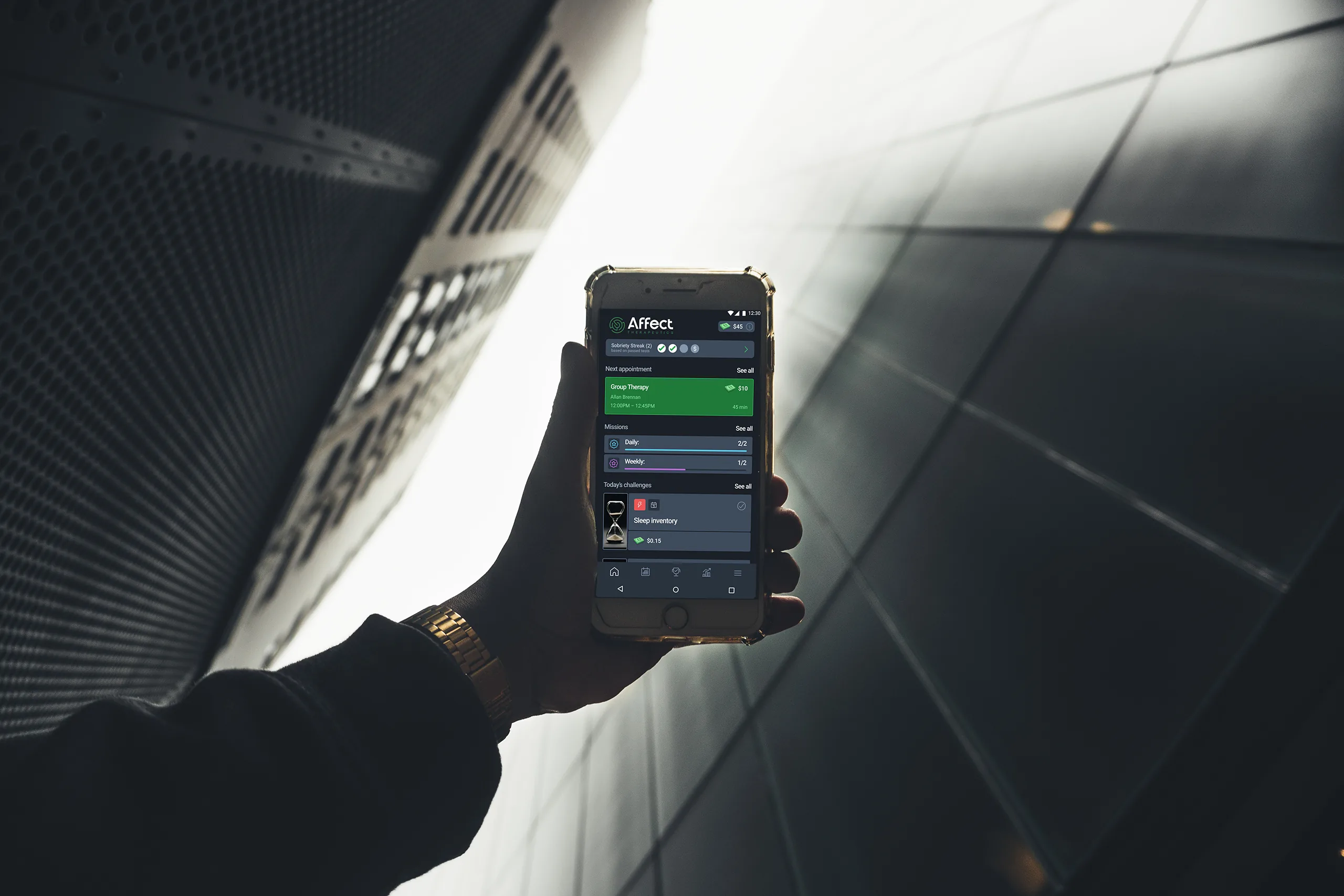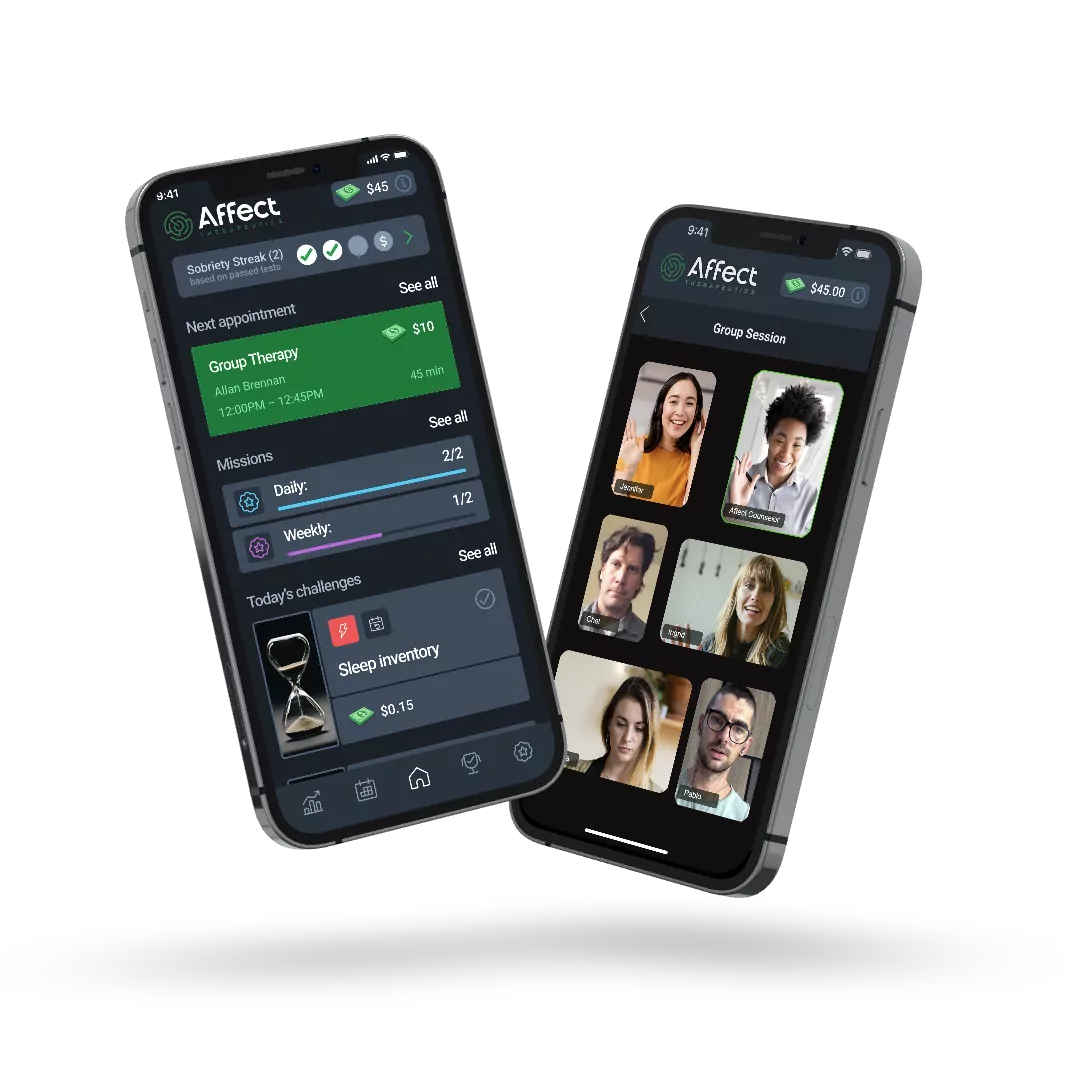
How to Stop Using Fentanyl and Other Opioids
Neuroscience proves how rewards stimulate the brain to help you quit successfully
Quitting fentanyl, a potent synthetic opioid, requires specialized treatment and support due to its high potency and the growing prevalence of its use in counterfeit drugs and laced into other substances including cocaine, heroin, and even cannabis among others. Fentanyl is a deadly substance, just a small dose the size of a pencil lead can be enough to kill someone within minutes.
If you are struggling with fentanyl or other opioids, we can help you quit for good and reclaim your life. This guide provides valuable insights for individuals seeking to break free from fentanyl addiction, tailored for telehealth treatment options – such as Affect’s digital recovery program and app that motivates

Affect’s app uses gamification and rewards to stimulate the brain, proven by neuroscience to help break difficult addictions
Major Steps to Quit Fentanyl
- Recognition of Addiction: Acknowledge the presence of fentanyl addiction and the need for professional help.
- Comprehensive Assessment: Undergo a thorough evaluation by a healthcare provider to determine the most appropriate treatment plan.
- Managed Withdrawal: Safely detoxify under medical supervision to alleviate withdrawal symptoms and ensure safety.
- Medication-Assisted Treatment (MAT): Use medications like Suboxone or methadone to reduce cravings and withdrawal symptoms associated with fentanyl addiction.
- Behavioral Therapy: Engage in counseling and therapy sessions to address the psychological aspects of addiction and develop coping skills.
- Contingency Management: Participate in programs that provide rewards for maintaining sobriety and adhering to treatment goals.
- Harm Reduction Strategies: Implement measures to reduce the risk of overdose and other negative consequences associated with fentanyl use.
- Ongoing Support: Access support groups, peer counseling, and continuous care to sustain long-term recovery.
What is Fentanyl?
Fentanyl is a synthetic opioid that is up to 100 times more potent than morphine and significantly more potent than heroin. Originally developed for medical use as a powerful painkiller for severe pain, such as in advanced cancer patients or during surgical procedures, fentanyl has increasingly found its way into illicit drug markets.
Its potency and relatively low cost make it attractive to drug dealers seeking to increase the potency of other drugs or produce counterfeit prescription medications.
Fentanyl works by binding to the body’s opioid receptors, producing feelings of euphoria and pain relief, but it also depresses respiratory function, increasing the risk of overdose. Due to its potency, even a small amount of fentanyl can be lethal, making it a significant contributor to the opioid overdose crisis. Understanding the dangers of fentanyl and its prevalence in illicit drug markets is crucial for individuals seeking to overcome addiction and for public health efforts to combat the opioid epidemic.
How Quitting Fentanyl Differs from Other Opioids
Fentanyl addiction presents unique challenges compared to other opioids due to its extreme potency and the prevalence of its presence in counterfeit drugs and other substances. Fentanyl is commonly added to illicitly manufactured drugs like heroin, cocaine, and counterfeit pills, often without the user’s knowledge. This increases the risk of accidental overdose and complicates the addiction treatment process.
Fentanyl Addiction and Polydrug Use
The level of addiction to fentanyl has escalated in recent years, with a significant increase in overdose deaths attributed to its use. Many individuals unknowingly consume fentanyl-laced drugs, leading to a higher risk of addiction and overdose. Fentanyl is often used in combination with other drugs, amplifying its effects and contributing to the complexity of addiction treatment.
“Goofballing” is a practice of using an opioid and stimulant at the same time, such as fentanyl and meth. With a highly effective program for stimulant addiction treatment, Affect is uniquely able to treat polysubstance addictions successfully.
Counterfeit Drugs and Adulteration
Counterfeit drugs containing fentanyl have become alarmingly common in illicit drug markets, posing a serious threat to public health. Fentanyl is added to drugs like counterfeit painkillers, benzodiazepines, and stimulants, making them more potent and increasing the risk of overdose. The clandestine nature of drug production and distribution makes it challenging for users to discern the presence of fentanyl in their drugs, highlighting the importance of harm reduction measures like fentanyl test strips.
Telehealth for Fentanyl Addiction Treatment
Telehealth programs like Affect’s offer a convenient and accessible platform for individuals seeking treatment for fentanyl addiction. Through virtual appointments with healthcare providers, patients can receive comprehensive care, including medication management, counseling, and support services. Telehealth eliminates barriers to treatment, such as transportation and stigma, making it an ideal option for individuals struggling with fentanyl addiction.
Quitting fentanyl addiction requires a holistic approach that addresses the physical, psychological, and social aspects of addiction. By utilizing telehealth services and accessing evidence-based treatments like medication-assisted treatment, behavioral therapy, and harm reduction strategies, individuals can overcome fentanyl addiction and reclaim their lives. With the right support and treatment, recovery from fentanyl addiction is possible.

Can Affect’s Program Treat Fentanyl Addiction?
Affect’s program uses research-proven techniques and was created by some of the best researchers and scientists in the field of addiction treatment. Through your smartphone, you can get all the services of an outpatient treatment program without having to go to a rehab clinic. Care comes straight to you. And there’s more.
Since drugs rewire the brain’s rewards system, research has proven that the best way to beat substance use disorders is to stimulate the brain’s system in other ways. The most effective method is by winning rewards for doing things that help you quit. This method is known as “contingency management.”

To understand how it works, think about how you win points and beat levels in a game and how good it feels each time you do. The more you win, the more you want to keep playing. And even when it gets hard to beat a level, you keep going until you get that victory. Contingency management turns your recovery into a kind of game you don’t want to stop playing. Along the way, you start developing new healthy habits.
It is very common to relapse in early recovery, which is part of the reason why traditional rehab clinics with strict abstinence requirements often fail. Research shows that gradually reducing use over time works better, a method addiction specialists call “harm reduction.”
With these proven methods and a caring team that’s always at your fingertips, Affect’s digital program is in the 1% of all treatment providers. Data shows our program to be twice as effective as traditional methods to treat substance use disorders and help people quit using drugs. Our members praise the program for being able to help them when nothing else has worked.
Our members dramatically increase their number of sober days in just the first month. Their energy and health improves and their brains start to recover. With the help of licensed addiction counselors, members explore the roots of their addiction and learn how to identify and control triggers without feeling the need to use opioids. As withdrawal symptoms fade and healthy habits are formed, our members rebuild their lives as they recover from opioids. You can read what they have to say about our program.
Affect’s program is also unique in supporting “whole recovery” of our members’ lives. Care teams include advocates who provide members with support for housing, employment, healthcare and more.
Are you ready to stop using opioids and get your life back? Reach out and talk to us to find out more, or download the app and try it yourself.
Just tell us a bit about yourself and we’ll get right back to you
Suboxone® is a registered trademark of Indivior PLC. Any reference to it is for informational purposes only, and is not endorsed or sponsored by Indivior PLC.


